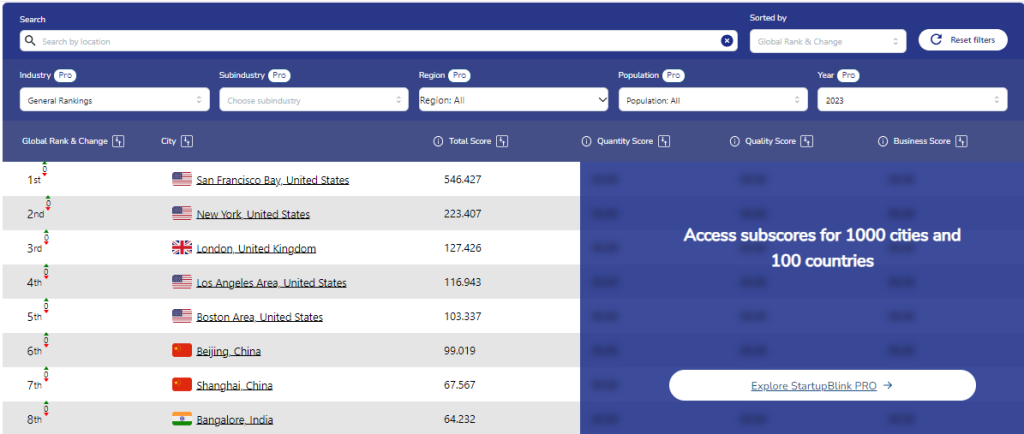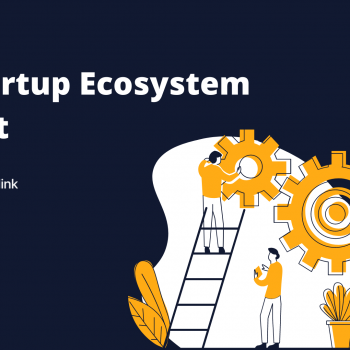In the competitive environment of startup ecosystems, how to scale a startup globally is a billion-dollar question. This interesting topic was the highlight of the 41st episode of the StartupBlink Ecosystem Podcast, where Mahmod Shamsi, Partnerships Manager at StartupBlink, engaged in a thought-provoking conversation with Eli David, the CEO of StartupBlink.
Get a head’s up on our next podcast episode — Subscribe on Apple Podcast, or Spotify!
Understanding the Importance of Global Scaling
The conversation began with a billion-dollar question: Should governments prioritize scaling their startups globally, or should the focus be on local markets? Eli emphasized that while local markets are important, particularly in populous countries like India and China, global scaling is vital for achieving unprecedented success. Scaling globally allows startups to access larger markets, generating massive revenue from international sources. This approach not only propels economic growth but also enhances a country’s export capabilities.
Governmental Role and Strategic Support
The role of governments in facilitating global scaling was a major focus of the discussion. Governments can significantly impact startups’ ability to scale globally through creating supportive policies, improving infrastructure, offering financial incentives, and fostering an innovation-conducive environment. Selective support for startups with feasible global strategies can accelerate their journey to international markets.
One of the primary ways governments can aid startups is through the development of supportive policies. This involves creating a regulatory framework that is conducive to business growth and innovation. Policies that simplify the process of starting and running a business, such as easing licensing procedures, reducing bureaucratic hurdles, and protecting intellectual property rights, can significantly lower the barriers to entry for startups. Additionally, international trade policies that promote cross-border collaborations and ease export-import processes are crucial for startups looking to scale globally.
Governments can also play a role in selectively supporting startups that demonstrate clear and viable strategies for global expansion. This could involve tailored support programs that address specific needs of these startups, such as market research, international networking opportunities, and assistance in navigating foreign regulatory landscapes. By focusing on startups with the potential for global impact, governments can maximize the effectiveness of their support and contribute to the creation of globally competitive businesses.
Choosing the Right Ecosystem: A Strategic Decision
An essential aspect of global scaling is selecting an appropriate ecosystem. Eli David advised startups to choose ecosystems that align with their sector. This strategic decision offers access to specialized resources, professional networks, and an environment tailored to sector-specific challenges and opportunities. With our ranking tables, you can browse how 1,000 cities and 100 countries’ startup ecosystems perform based on various criteria such as region, industry, and population range.
Choosing an ecosystem aligned with the startup’s industry opens doors to specialized resources that are crucial for development and innovation. These resources can include state-of-the-art technology, research facilities, skilled talent pools, and sector-specific mentorship. Access to such resources enables startups to refine their offerings, innovate, and stay ahead of industry trends. You browse the 1,000 cities and 100 countries’ startup ecosystems on our Global Startup Ecosystem Map, and identify the ones with critical amounts of startup output, support and special entities.
The Impact of Global Trends on Scaling Strategies
The conversation then shifted to the influence of emerging global trends on scaling strategies. While AI is a significant trend, Eli stressed the importance of not focusing solely on one trend. Other sectors like Blockchain, climate tech, and space tech also present substantial opportunities for startups aiming to scale globally. You can view the latest trends in startup industries and verticals in this article.
In-depth knowledge of geopolitical trends can also present opportunities. Startups that can anticipate and adapt to geopolitical shifts can gain a competitive edge, identify new market niches, or develop innovative solutions to meet the unique needs arising from these changes.
The Significance of Cultural Adaptation
Startups must cultivate cultural intelligence to effectively adapt to various markets. This involves understanding local customs, consumer behavior, and societal norms. It’s about appreciating the nuances of communication styles, business etiquette, and consumer preferences that vary from one culture to another.
Cultural adaptation often requires tailoring products and services to meet local tastes and expectations. This could mean modifying product features, adapting marketing strategies, or even altering business models to align with local practices and preferences.
Establishing strong relationships with local partners, customers, and stakeholders is crucial. These relationships are built on mutual respect and understanding of cultural contexts. Engaging with local communities and showing a genuine interest in their culture can create a strong foundation for long-term business success.
Startups must be prepared to overcome cultural barriers that might impede their market entry or growth. This includes addressing language barriers, understanding legal and social norms, and navigating different business practices.
The Path Forward: Innovation and Adaptability
The podcast concluded with the recognition that global scaling presents both challenges and opportunities. Startups must be innovative, adaptable, and have a clear vision. Innovation is the cornerstone of global scaling. Startups need to continually innovate not just in their product or service offerings but also in their business models, marketing strategies, and operational processes. This innovation should be driven by a deep understanding of global market trends and customer needs.
Keeping abreast of global trends is crucial for startups aiming to scale. This involves staying informed about technological advancements, shifts in consumer behavior, and emerging market opportunities. By anticipating and responding to these trends, startups can maintain their competitive edge and adapt their strategies accordingly.
The ability to adapt to changing market conditions is a key determinant of success in global scaling. Startups must be flexible in their approach, ready to pivot their strategies in response to new opportunities or challenges. This adaptability extends to all aspects of the business, from product development to supply chain management.
To Sum Up,
The decision to scale a startup requires strategic planning, an understanding of global trends, governmental support, and an understanding of the ecosystem’s strengths and weaknesses. Staying local is not a thing that every ecosystem can afford, and only those with a massive population have the flexibility to keep their startups local.










